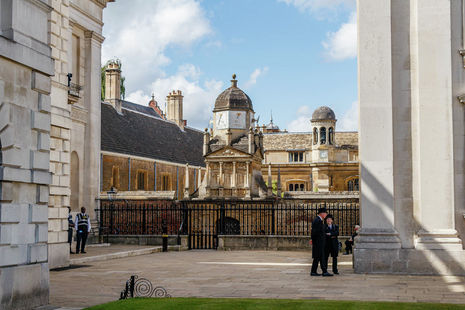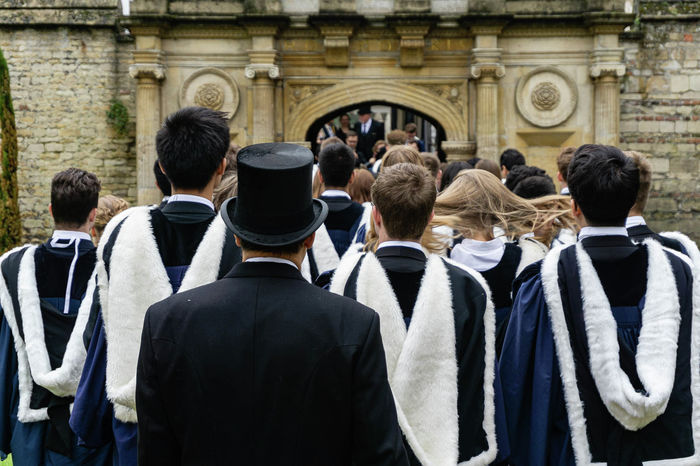Cambridge nominates Nobel laureate and several other renowned scholars for honorary degrees
This year’s nominees include physicists, biologists, journalists and musicians

The University has released the names of those nominated for honorary degrees, despite this year’s ceremony, scheduled for June 17th, being interrupted by the coronavirus pandemic.
Vice-Chancellor Stephen Toope has described honorary degrees as an “opportunity to pay homage to individuals of remarkable talent and achievement, both in the United Kingdom and around the world.” He also remarked that he looks forward to a moment when we will be able to celebrate these individuals in person once again.
The University confers honorary degrees through assessment and submission. Any member of the University can nominate an individual for an honorary degree, after which nominations go through the University’s Honorary Degree Committee and the Council before they are submitted to Regent House, the University’s Governing Body, for final approval. Honorary degrees may be under consideration for several years before they are awarded.
This year’s nominees come from a range of disciplines and backgrounds.
Professor Sir Roger Penrose has been nominated for a Doctor of Science. Penrose, who specialises in Mathematical Physics, is also Emeritus Rouse Ball Professor of Mathematics of Oxford and Emeritus Fellow at Wadham College. Penrose has made several contributions to the mathematical physics of general relativity and cosmology, including calculating many of the basic features of black holes. He has received a variety of prizes including the 1988 Wolf Prize which he shared with Stephen Hawking for the Penrose-Hawking singularity theorems.
Professor Sir John Walker has also been awarded a Doctor of Science. Walker, who won the Nobel Prize in Chemistry in 1997, specialises in molecular biology and his current work focuses on “understanding the molecular mechanism of how ATP is made”. As of 2015, Walker is Emeritus Director and Professor at the MRC Mitochondrial Biology Unit in Cambridge. In 2019 he was also awarded an Honorary Fellowship at the Cambridge Philosophical Society. He is also a Fellow at Sidney Sussex and an Honorary Fellow at Oxford’s St. Catherine’s College.
Meanwhile, Professor Henry Louis Gates Jr. has been nominated for a Doctor of Letters. Gates is a literary scholar, Emmy-award winning film-maker and journalist. He is also Alphonse Fletcher University Professor and Director of the Hutchins Center for African and African American Research at Harvard University.
In television, Gates contributed to 18 documentaries on black history and he hosted six seasons of PBS’ “Finding Your Roots”, a series which investigates the genealogy of prominent American figures.
In 2009, Gates was controversially arrested after a witness called the police when they saw Gates trying to enter his own home. Gates was charged with disorderly conduct by an officer who was later accused of racial bias. President Obama later hosted the ‘Beer Summit’, in which he invited both the officer and Gates to the White House to discuss the issue over beer.
Professor Sir Simon Schama has also been nominated for a Doctor of Letters. Schama is a Professor of Art History and History at Columbia University and has previously held positions at Harvard and Oxford, as well as being a Fellow and Director of Studies in History at Christ’s College. He has written several books and contributed to multiple TV and radio shows. In particular, Schama wrote “A History of Britain”, a 15-part BBC documentary which aired between 2000-2002.
In 2017, among many other accolades, Schama became a fellow of the Royal Society of Literature and in 2018 he was knighted for his services in history. In the same year, Schama expressed concern about antisemitism in the Labour Party, arguing that some anti-Zionism incorporated antisemitic tropes.
Professor Edith Heard and Professor Elizabeth Robertson, both developmental biologists, have both also been awarded a Doctor of Science.
Heard is Professor of Epigenetics and Cellular Memory at Collège de France, and Director General of the European Molecular Biology Laboratory. She is known for her studies on X chromosome inactivation.
Robertson is Professor of Developmental Biology and Wellcome Trust Principal Research Fellow at Oxford. She works with mouse genetics with the long-term goal of learning more “about the molecular and cellular mechanisms that govern tissue morphogenesis in an orderly fashion as cells diversity and acquire specialised functions within the embryo”.
Ali Smith and Judith Weir have been nominated for a Doctor of Letters and a Doctor of Music respectively. Smith, who is a writer, playwright and academic who has written for The Guardian, The New Statesman and The Times Literary Supplement, was also awarded an honorary doctorate by Newcastle University in 2019.
Weir, who is the President of the Royal Society of Musicians since 2016, was appointed as the first female Master of the Queen’s Music in 2014. This latter role is a post in the Royal Household who is responsible for directing the court orchestra and composing music as is required by the monarch.
Previous honorary degrees conferred by the University include those awarded to Jane Goodall, Ban Ki-moon, Noam Chomsky, Jacques Derrida and Ian McKellan.
 Features / Should I stay or should I go? Cambridge students and alumni reflect on how their memories stay with them15 December 2025
Features / Should I stay or should I go? Cambridge students and alumni reflect on how their memories stay with them15 December 2025 News / Cambridge study finds students learn better with notes than AI13 December 2025
News / Cambridge study finds students learn better with notes than AI13 December 2025 News / Uni Scout and Guide Club affirms trans inclusion 12 December 2025
News / Uni Scout and Guide Club affirms trans inclusion 12 December 2025 Comment / The magic of an eight-week term15 December 2025
Comment / The magic of an eight-week term15 December 2025 News / News In Brief: Michaelmas marriages, monogamous mammals, and messaging manipulation15 December 2025
News / News In Brief: Michaelmas marriages, monogamous mammals, and messaging manipulation15 December 2025








